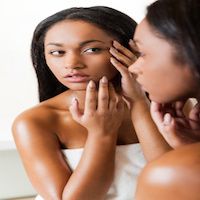Article
Living with Rosacea: Signs and Symptoms
Author(s):
Early treatment of rosacea is crucial for the prevention of irreversible damage.
This article originally appeared in Pharmacy Times.

Rosacea is a long-term inflammatory dermatologic condition that affects an estimated 16 million people in the United States. It occurs more often in individuals between the ages of 30 and 60 years and affects primarily women and individuals with fair skin. However, this skin condition can affect anyone at any age and, if left untreated, will worsen over time. While women are more likely to get rosacea, men are more likely to get more severe cases of rosacea.
Signs and symptoms
The signs and symptoms of rosacea can vary in type and degree of severity from individual to individual. Rosacea causes redness or flushing of the skin around the cheeks, nose, chin, forehead, and sometimes eyelids. Individuals with rosacea may also have raised red bumps that resemble acne and may present with a red swollen nose.
During the course of rosacea, patients experience flare-ups and periods of remission. More than 50% of individuals with rosacea have eye issues such as dryness, burning, excess tearing, and inflamed and swollen eyelids. The eyes may also become sensitive to light or some other visual issues.
What causes rosacea?
While the exact cause of rosacea is still unknown, it does involve the swelling of the blood vessels just under the skin. Some research suggests that rosacea may be hereditary or related to one’s immune system. Research also suggests that rosacea may be linked to the bacterium Helicobacter pylori, which is responsible for peptic ulcer disease. Your doctor can easily diagnose rosacea by examining your skin and asking you questions about your symptoms and medical history. Factors or triggers that may make rosacea worse have been identified.
Visit Pharmacy Times to access the full-text version of this article.





